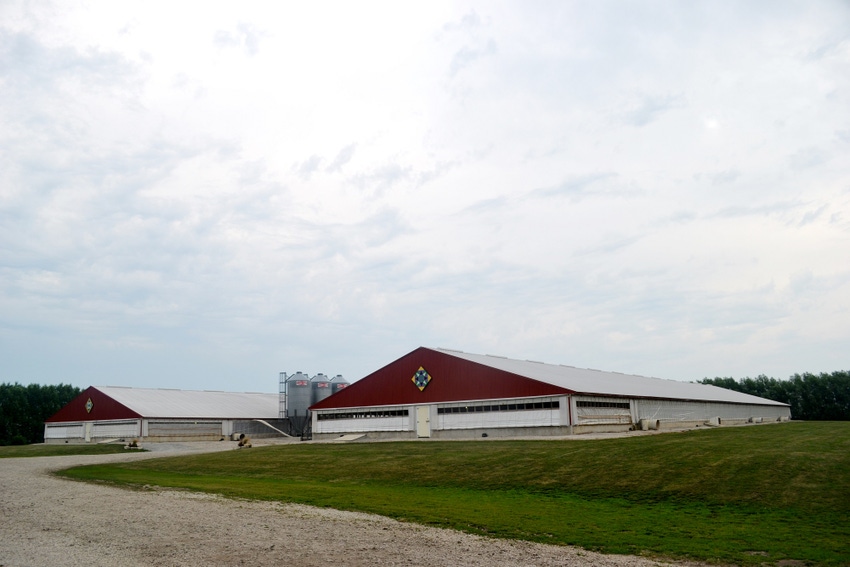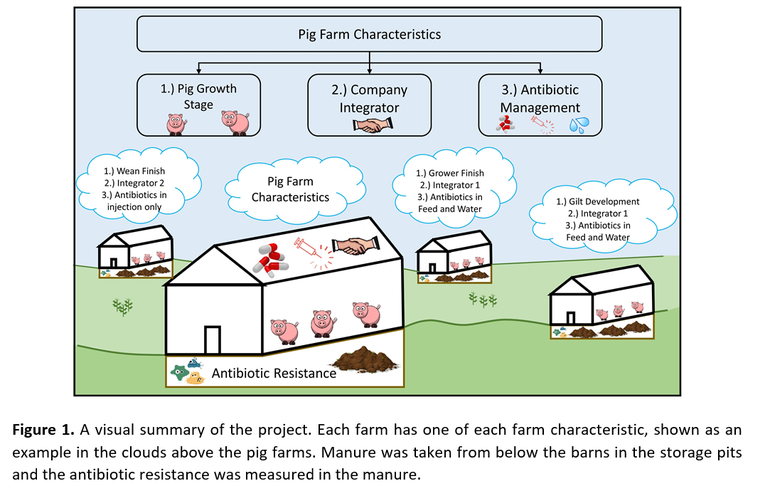Pig producers and company integrators must work together to help reduce antibiotic resistance.
August 20, 2021

Iowa produces the most pigs in the United States. Veterinarians and farm managers give antibiotics to the pigs to keep them strong and healthy, much like the use of medicine for patients in hospitals. In general, antibiotics do a good job of killing harmful bacteria. But some bacteria are able to survive in the presence of antibiotics, known as antibiotic resistance. It is important to lower the chances for antibiotic resistance for antibiotics to stay effective. One place we often find antibiotic resistance is in manure stored under pig farms. The manure contains bacteria, antibiotics and antibiotic resistant bacteria. The goal of this project is to see if pig farm management can change the antibiotic resistance in the stored manure.
Our study took manure from 50 pig farms across the state of Iowa. The pig farm management information we have on each farm is their pig’s growth stages (gilt-development, wean-finish, and grower-finish), the company integrator (1 or 2), and the antibiotic management (in feed and water or injection only). We measured the amount of antibiotic resistance in each of the 50 manure samples. With the amounts of antibiotic resistance in the manure known, we were able to compare the different management types.

First, we compared antibiotic resistance in the pig’s growth stages to see if the different growth stages had a difference in measured antibiotic resistance. We observed that yes, the growth stages showed differences in the amount of antibiotic resistance measured in the manure samples. This makes sense because pigs are given different amounts of medicine at different times in their lives. For example, a piglet would probably need more antibiotics to help it survive than a fully grown pig.
Next, we compared the company integrators of each pig farm. Each pig farm was in partnership with one company integrator. The company integrator provides pig farms inputs to their operation like piglets, feed, and most importantly, veterinary services. We found that the company integrator played a significant role in the amount of antibiotic resistance found in the pig manure. Because the company integrator makes decisions about veterinary services, the decisions of which type of antibiotic given to the pigs is ultimately up to the company integrator and veterinarian. It is important for the company integrator to understand the importance of their role in how their decisions can affect the antibiotic resistance found in the pig manure.
Finally, we compared the pig farms that gave antibiotics to their pigs in the feed and water to those pig farms that did not. Interestingly, we found that the farms that did not give antibiotics in the feed and water had higher antibiotic resistance in the manure. This is surprising because we generally know that using antibiotics will increase the amount of antibiotic resistance we measure in the pig manure. We can guess that farm managers in the farms without antibiotics in food and water were using another practice to keep their pigs healthy that might also impact antibiotic resistance in manure.
Antibiotic resistance is a global issue that requires partnerships between many groups. This study showed that pig farm management can lead to differences in antibiotic resistance in stored manure. This is also important because manure is applied to crop land and runoff from these fields can impact water quality and public health in areas where human recreate. Pig producers and company integrators must work together to help reduce antibiotic resistance.
Pig farm management plays a role in resulting antibiotic resistance in manure.
Pig farms where antibiotics were only given by injection had higher measured antibiotic resistance in pig manure than in farms where antibiotics were added in feed and water.
Source: Michelle L. Soupir, Iowa State University, who are solely responsible for the information provided, and wholly owns the information. Informa Business Media and all its subsidiaries are not responsible for any of the content contained in this information asset. The opinions of this writer are not necessarily those of Farm Progress/Informa.
You May Also Like



